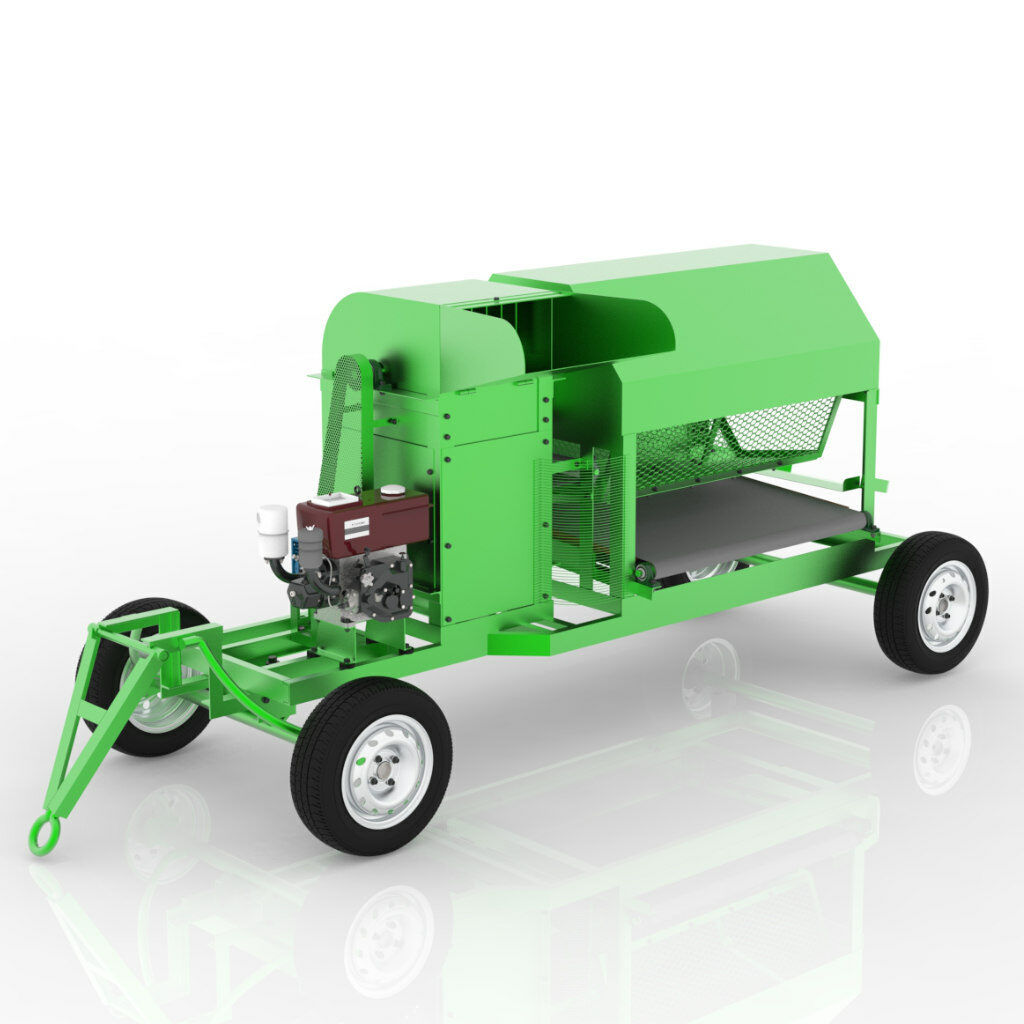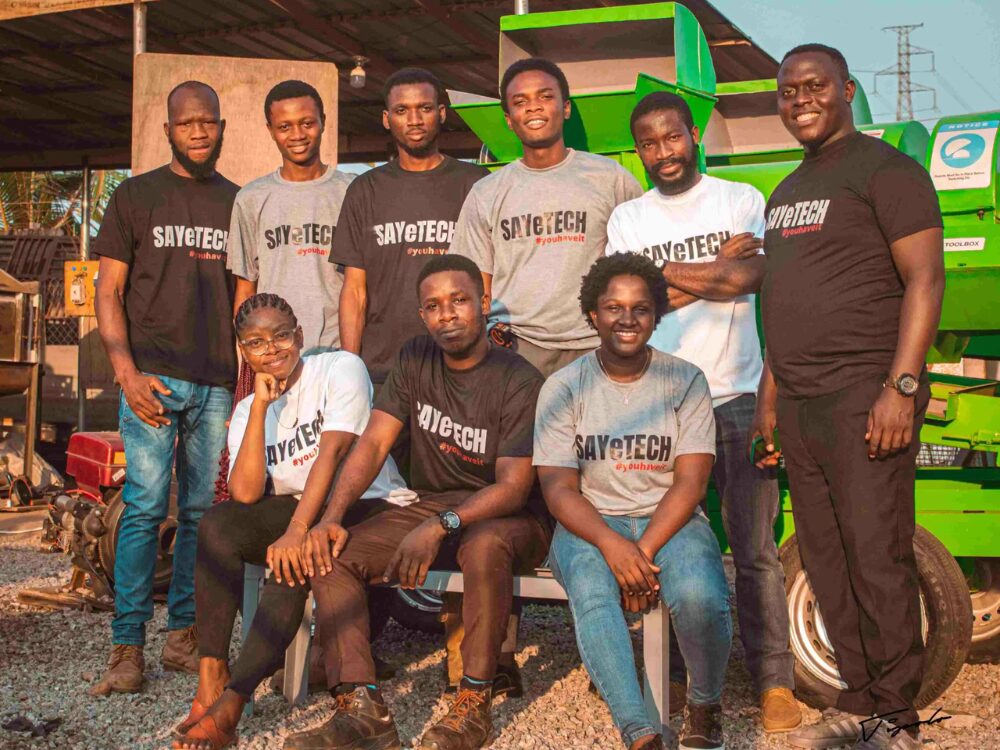[Disclosure: AgFunderNews’ parent company AgFunder is an investor in SAYeTECH.]
In Jeffrey Boakye Appiagyei’s own words, his company SAYeTECH tackles “the everyday struggles of smallholder farmers.”
Africa is home to some 33 million smallholder farmers that contribute around 70% of the continent’s food supply. Despite the central role these farmers play in the food system, they frequently lack access to training, mechanization, and data that could improve productivity and efficiency. Lack of mechanization, in turn, helps perpetuate the cycle of poverty in addition to taking children away from valuable educational opportunities.
SAYeTECH addresses one specific part of this equation: post-harvest losses, which the company says can impact productivity, yield, and ultimately livelihoods.
“Limited access to affordable machinery forces farmers to rely on outdated tools, reducing productivity and income,” Appiagyei recently noted when profiled for AgFunder’s 2025 Developing Markets AgriFoodTech Investment report.
“SAYeTECH is addressing this problem by developing cost-effective, smart sensor-enabled agricultural machinery that enhances efficiency, minimizes losses and improves food security in these regions,” he tells AgFunderNews.
Lack of mechanization ‘forcing children away from their education’
For Appiagyei and the rest of the team, bringing mechanization to smallholder farmers isn’t just about boosting yields and efficiency, though.
“My co-founder, Theodore [Ohene-Botchway, CTO], and I started SAYeTECH with a vision to transform agriculture in Africa and to keep children in school,” says Appiagyei.
The vision surfaced years ago, when he worked as a teacher and missionary in rural Ghana, where he witnessed children having to leave school during harvest seasons to help their parents.
“This struck me deeply, knowing that a lack of access to mechanization in agriculture was forcing children away from their education.”
A lack of education contributes to the cycle of poverty these smallholder farmers face. Appiagyei and Ohene-Botchway determined that the best way to break this cycle would be to offer “practical, accessible tools” that could increase productivity and at the same time enable children to stay in school.
“At the heart of SAYeTECH is the goal of empowering communities to thrive and build resilience starting with ensuring that children can stay in school,” says Appiagyei.

Applying ‘smart’ machinery to post-harvest practices
Currently, the average African smallholder farmer uses a handful of manual tools (e.g., cutlasses, mattocks, even sticks etc.) to carry out post-harvest activities like threshing, cocoa-pod breaking, and drying of cereal grains.
SAYeTECH’s offerings include an array of machines equipped with Internet of Things (IoT)-embedded systems to make them “smart” and thereby increase the efficiency of processes.
“Traditional threshing and processing methods are time-consuming, labor-intensive, and result in grain losses of up to 30%,” explains Appiagyei. “Limited access to affordable machinery forces farmers to rely on outdated tools, reducing productivity and income.”
For example, manual threshing often requires extra labor to help separate seeds from plants, and can take weeks to complete. SAYeTECH offers a multi-crop thresher that mechanically handles the job, alleviating smallholders’ labor concerns and costs in the process, and completing the task in a matter of hours.
The company also currently offers a cocoa-pod-breaking machine and a cereal dryer, as well as design services for engineering institutions designing products.
“SAYeTECH, by building smart machinery for farmers, is very well positioned to unlock revenue and scalability for millions of farmers in Africa,” local investor Ing Kakra Sersah noted in AgFunder’s report. “It was and has always been a no-brainer that it will succeed. That is why I backed it early.”
‘Promising strides’ for fundraising in 2025
The last few years have been “both challenging and rewarding” for SAYeTECH, says Appiagyei.
The company participated in AgFunder’s GROW accelerator program, raised $100,000 in seed funding, and launched field trials with farmers to showcase the benefits of its machines to farmers.

SAYeTECH currently works with farmers across Ghana, Nigeria, and Niger.
Funding remains something of a challenge for the company, says Appiagyei, though SAYeTECH has “made promising strides.”
“There is increasing support from investors and accelerators, but funding for hardware startups remains a major hurdle. Infrastructure gaps, supply chain inefficiencies, and inconsistent policies also create obstacles,” he notes.
“Despite this, the demand for mechanization, a young workforce, and untapped markets present huge opportunities and we hope to overcome the sector’s challenges by leveraging local expertise and forging strategic partnerships.”
SAYeTECH’s key focus in 2025 is addressing the previous year’s unmet demand for machinery.
“Due to limited operational capacity, we were only able to meet 20% of client demand for equipment last year. This added to the $3 million+ worth of product we have been unable to supply over the past six years.”
The company also plans to deploy 250 smart sensors and unveil the first pilot of its sensor-powered cocoa-pod breaker.
“A key prerequisite for batch production and keeping inventory instead of ‘just in time’ is funding,” says Appiagyei. “As such, we want to complete a modest fundraise this year.”





